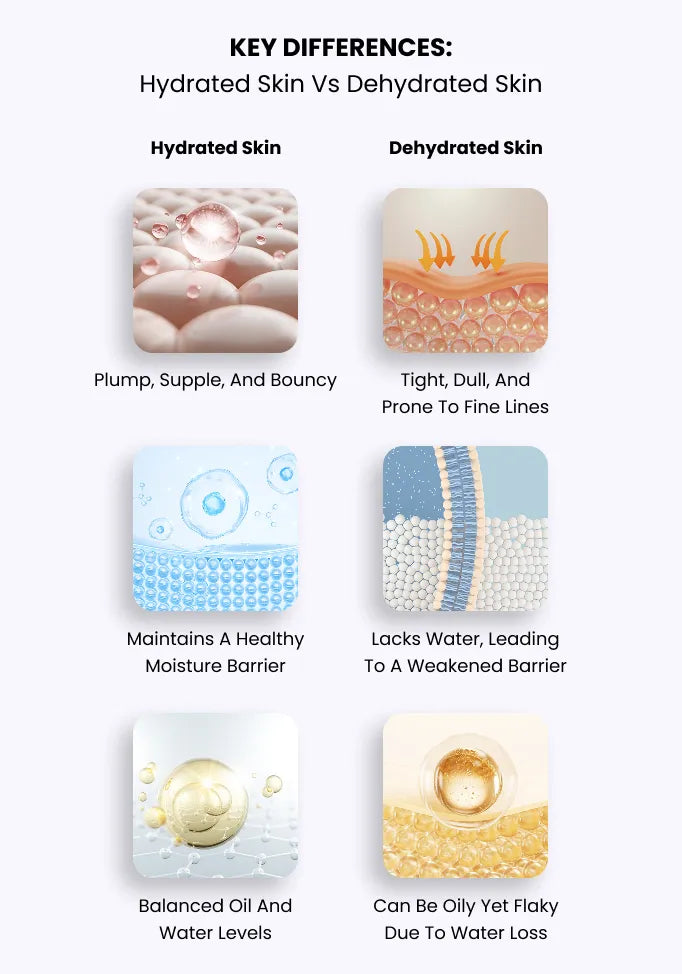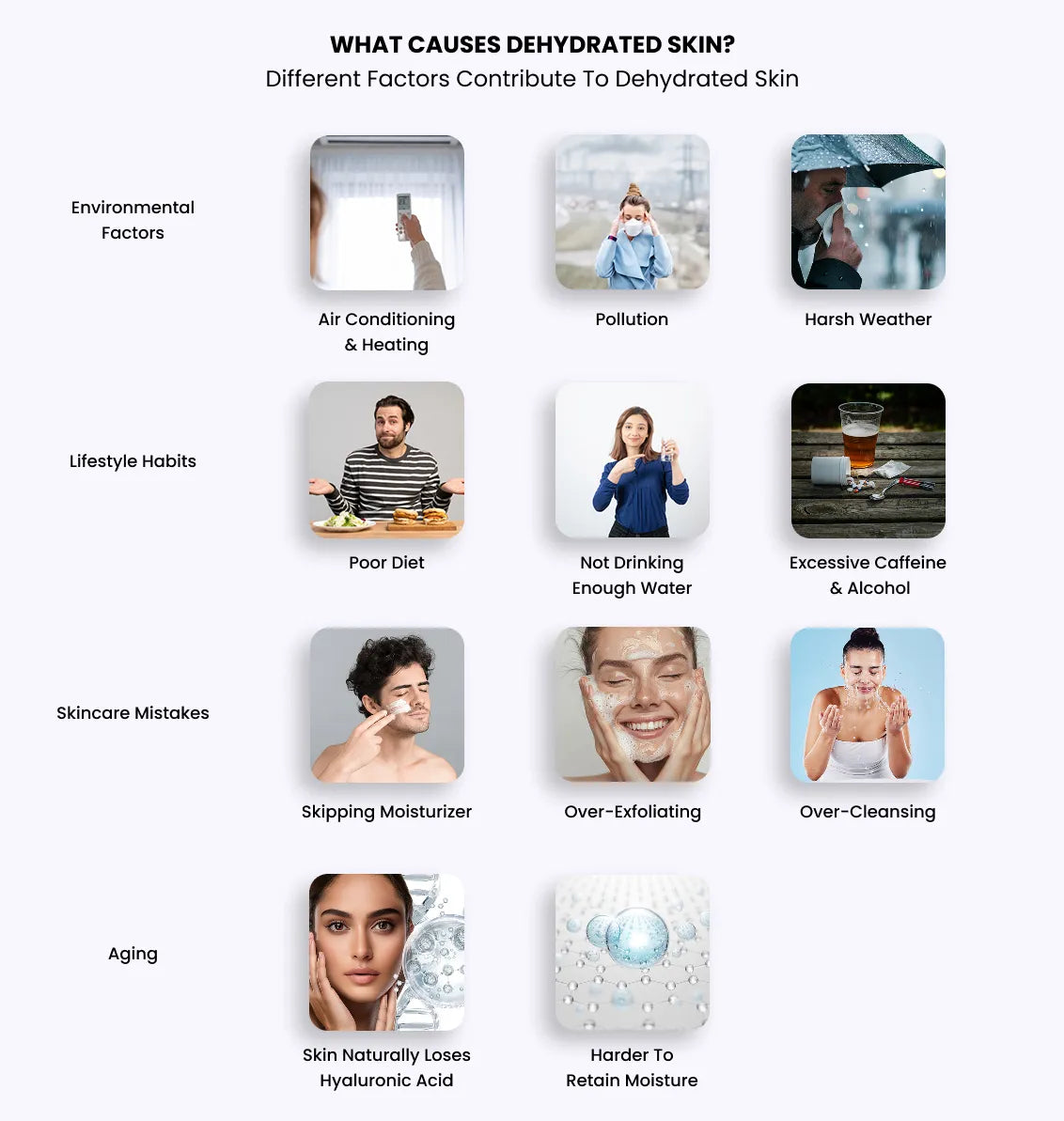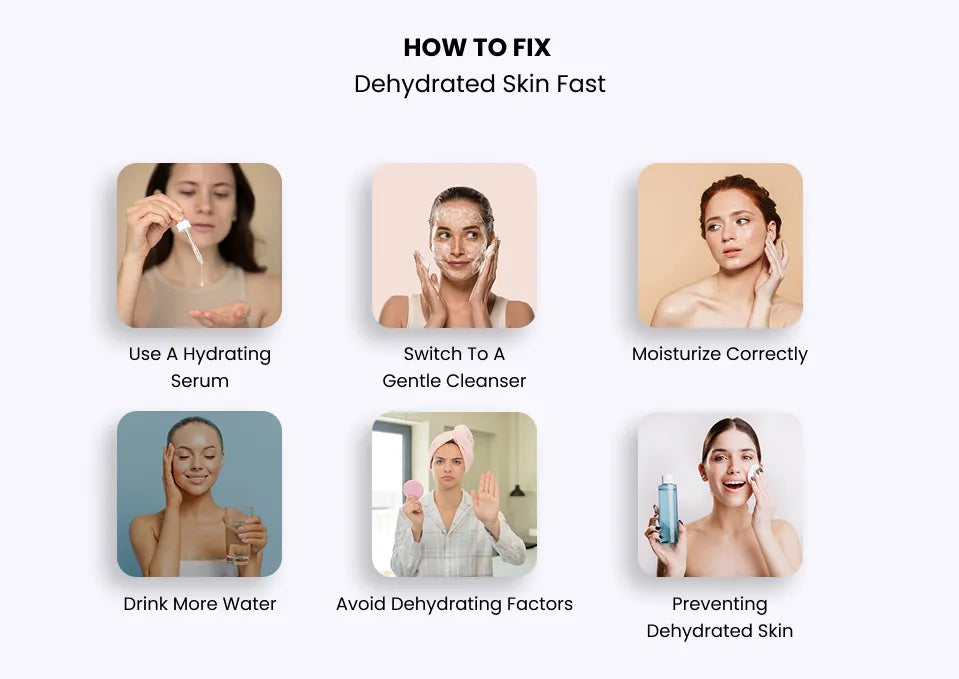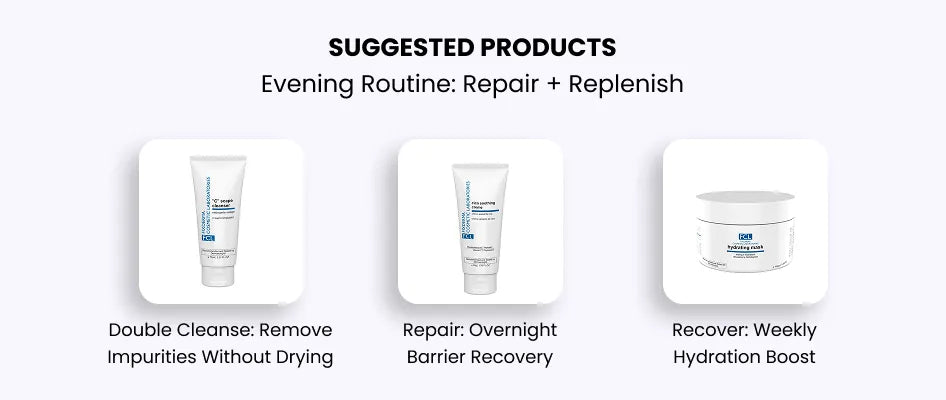
5 Signs You Have Dehydrated Skin And How To Fix It Fast
By: Sandip KumarTable of Contents
Dehydrated skin is a common but often misunderstood condition, as it can affect all skin types, including oily and combination skin. Unlike dry skin, which lacks oil, dehydrated skin lacks moisture, this makes it a temporary condition rather than a permanent skin type.
Signs of a dehydrated skin include tightness, dullness, and sensitivity, your skin may feel uncomfortable and look tired. The good news is that it’s treatable; with the right care, you can restore moisture and improve skin health.
This blog will explain the causes of dehydrated skin, how to spot the signs, and the best ways to treat and prevent it. So read it till the end and give your skin the hydration is needed desperately.
What Is Dehydrated Skin?
Dehydrated skin happens when the skin’s moisture barrier is weakened. This causes a loss of water, not oil. Unlike dry skin, which is a long-term skin type, dehydration is temporary. It affects all skin types and can be improved with proper care focused on restoring hydration and strengthening the barrier.
Key Differences: Hydrated Skin Vs Dehydrated Skin

|
Hydrated Skin |
Dehydrated Skin |
|
Plump, supple, and bouncy |
Tight, dull, and prone to fine lines |
|
Maintains a healthy moisture barrier |
Lacks water, leading to a weakened barrier |
|
Balanced oil and water levels |
Can be oily yet flaky due to water loss |
What Causes Dehydrated Skin?

Different factors contribute to dehydrated skin, like:
1. Environmental factors
- Air conditioning & heating (strips moisture from the air)
- Pollution (damages the skin barrier)
- Harsh weather (cold winters, dry climates, excessive sun exposure)
2. Lifestyle habits
- Poor diet (lack of water-rich foods)
- Not drinking enough water (leading cause of dehydration)
- Excessive caffeine & alcohol (both are diuretics that dehydrate)
3. Skincare mistakes
- Skipping moisturizer (especially after washing your face)
- Over-exfoliating (disrupts the skin barrier)
- Over-cleansing (using harsh, sulfate-based cleansers)
4. Aging
As we age, our skin naturally loses hyaluronic acid. That is making it harder to retain moisture.
5 Signs You Have Dehydrated Skin

1. Your skin feels tight and uncomfortable
Why This Happens
When your skin lacks water, it loses elasticity, which leads to that tight, stretched feeling, especially after cleansing. This is one of the most common dehydrated skin symptoms.
How to Fix It
- Switch to a hydrating cleanser for dry skin that doesn’t strip natural moisture. Also, look for sulfate-free formulas.
- Avoid hot water, as this can worsen dehydration; opt for lukewarm water instead.
- Apply a hydrating serum for dry skin with hyaluronic acid. This will immediately after washing to lock in moisture.
2. You notice increased fine lines and dullness
Why This Happens
Dehydrated skin loses plumpness, making fine lines more noticeable. A lack of hydration also leads to a dull and tired-looking complexion.
How to Fix It
- Use a hydrating serum for dry skin with ingredients. Such as glycerin, ceramides, or aloe vera.
- Exfoliate gently (1-2 times a week). To remove dead skin cells and improve absorption of hydrating products.
- Boost hydration from within by drinking plenty of water; by eating water-rich foods (cucumbers, watermelon, oranges).
3. Your skin gets oily yet flaky
Why This Happens
This is a classic sign of dehydrated skin acne, mostly when skin lacks water, it overproduces oil to compensate. This is leading to breakouts and flakiness; a frustrating combination.
How to Fix It
- Try the skin pinch test: Gently pinch your cheek. If it wrinkles or doesn’t bounce back quickly, your skin is dehydrated.
- Use a lightweight, non-comedogenic moisturizer to balance oil production.
- Avoid harsh acne treatments that can worsen dry and dehydrated skin.
4. Your makeup doesn’t apply smoothly
Why This Happens
A dehydrated face often leads to patchy, uneven makeup application because the skin’s texture becomes rough and flaky.
How to Fix It
- Apply a hydrating primer before makeup to create a smooth base.
- Opt for cream-based or liquid makeup products instead of powders, which can cling to dry patches.
- Keep a facial mist on hand to refresh your skin throughout the day.
5. You experience increased sensitivity
Why This Happens
A weakened moisture barrier makes dehydrated skin. This is more prone to redness, irritation, and reactions to skincare products.
How to Fix It
- Use soothing ingredients like aloe vera, centella asiatica, and niacinamide.
- Sleep with a humidifier to add moisture to the air, especially in dry climates or during winter.
- Avoid alcohol-based toners and astringents, which can further dry out your skin.
How to Fix Dehydrated Skin Fast

1. Use a hydrating serum
- Apply to damp skin for better absorption.
- Look for hyaluronic acid, glycerin, or squalane.
2. Switch to a gentle cleanser
- Avoid sulfates; opt for a hydrating cleanser for dry skin.
3. Moisturize correctly
- Apply moisturizer on damp skin to lock in hydration.
- Use products with ceramides to repair the skin barrier.
4. Drink more water
- Eat water-rich fruits and veggies.
- Aim for 8-10 glasses daily.
5. Avoid dehydrating factors
- Limit hot showers.
- Use a humidifier in dry environments.
- Reduce caffeine and alcohol intake.
6. Preventing dehydrated skin
- Always wear sunscreen (UV rays dehydrate skin).
- Avoid over-exfoliating (stick to 1-2x a week).
- Sleep 7-8 hours (skin repairs itself at night).
Suggested products
Struggling with dehydrated skin? Master all-day hydration with this science-backed routine featuring FCL Skincare’s premium solutions. Whether you're battling dry skin in summer or year-round dehydration, this regimen will restore moisture and strengthen your skin barrier.
Morning routine: hydrate + protect

1. Cleanse: Prep Skin for Maximum Absorption
Start your day with C Scape Cleanser Vitamin C Face Wash to gently remove impurities without stripping moisture. A mild cleanser ensures your skin stays hydrated while preparing it for better product absorption.
Why It Works
- Maintains the skin’s natural moisture barrier
- Prevents tightness and dryness post-wash
2. Treat: Deep Hydration with Hyaluronic Acid
While the skin is still damp. One can apply FCL’s Hyaluronic Acid Serum; a powerhouse for dehydrated skin treatment, as this lightweight serum penetrates deep to plump fine lines and boost radiance.
Why It Works
- Reduces the appearance of dehydration-induced wrinkles
- Attracts and retains moisture in the skin
3. Protect: Shield Against UV-Induced Dehydration
Finish with FCL’s SPF 80 Sunscreen Lotion to prevent UV damage. Mostly which worsens dehydrated skin. Reapply every 2 hours if you’re outdoors.
Why It Works
- Sun exposure accelerates water loss; SPF locks in hydration
- Prevents premature aging caused by dehydration
Evening routine: repair + replenish

1. Double Cleanse: Remove Impurities Without Drying
Start with an oil-based cleanser to dissolve sunscreen and makeup. Follow with FCL C Scape Cleanser (with 0.5% Vanilla Extract & Vitamin C) for a thorough yet gentle cleanse.
Why It Works
- Oil cleansing prevents over-stripping of natural oils
- Vitamin C boosts hydration while brightening
2. Repair: Overnight Barrier Recovery
Apply FCL’s Cica Soothing Cream to reinforce the moisture barrier while you sleep. This ultra-nourishing cream calms irritation and supports the skin’s natural repair cycle.
Why It Works
- Cica (Centella Asiatica) soothes redness and irritation
- Strengthens skin’s defense against moisture loss
3. Recover: Weekly Hydration Boost
Once or twice a week, use FCL’s Hydrating Mask for an intensive moisture surge. Wake up to softer, plumper, and more supple skin.
Why It Works
- Delivers concentrated hydration to combat dehydrated face
- Restores skin elasticity and glow
Why does this routine work for dehydrated skin?
- Morning hydration locks in moisture early
- Evening repair maximizes skin’s natural recovery
- FCL’s science-backed formulas target dehydration at every step
Conclusion
Dehydrated skin is a temporary but frustrating condition that can affect anyone, one can restore your skin's moisture balance. Mostly by understanding the difference between dry and dehydrated skin. Also recognizing the dehydrated skin symptoms, and using the right dehydrated skin treatment. Incorporate a hydrating serum for dry skin and a hydrating cleanser. Also the lifestyle changes like drinking more water to keep your skin plump and glowing.
Ready for quenched, glowing skin? Try FCL’s hydration heroes today!
FAQs
-
Can dehydration cause breakouts even if I have oily skin?
Absolutely! When skin is dehydrated, it overproduces oil to compensate. This is leading to clogged pores and acne - what we call "dehydration breakouts". -
Why does my skin feel drier after using hyaluronic acid?
This happens when HA is applied to dry skin or in dry climates without sealing it in. Always apply to damp skin and layer with moisturizer to lock in hydration. -
Can drinking water alone fix dehydrated skin?
While hydration from within helps, topical treatments are crucial too. -
How long does it take to repair dehydrated skin?
With consistent care, most see improvement in 2-4 weeks. Severe cases may take 6-8 weeks as the moisture barrier fully repairs itself. -
Is dehydrated skin more common in summer or winter?
Surprisingly, both! Winter's dry air and summer's sun/AC exposure both dehydrate. The key is adjusting your routine seasonally. -
Can stress cause dehydrated skin?
Yes! Stress triggers cortisol, which weakens your skin barrier, this is why skin often looks dull during stressful periods despite good skincare. -
Why does my skin look worse after exfoliating if it's dehydrated?
Over-exfoliating damages the moisture barrier, that is why switch to gentle enzymes or PHAs instead of harsh scrubs or acids until hydration improves.





